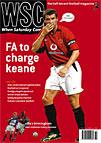 Football can bring out the best in people. Is this really the motive of Libya's notorious leader? Alan Duncan discusses a potentially unfounded change of tack
Football can bring out the best in people. Is this really the motive of Libya's notorious leader? Alan Duncan discusses a potentially unfounded change of tack
Seen from the outside, it’s an intrigue that could perhaps be adapted to an Austin Powers movie. After decades of championing international terrorism, Dr Evil and his cloned son finally decide to go down the straight and narrow. They shock the world through their new-found sense of tolerance and magnanimity of spirit rather than their erstwhile moral depravity. The reason for such a drastic transformation? The sudden realisation that football can provide them with the unlimited access to the fame and power they have long failed to achieve through criminal deeds.
A very unrealistic and far-fetched scenario this most certainly is, but world football has had an unlikely addition to its cast list since January. That was when El Saadi Gadafy, the son of the Libyan leader, Colonel Muammar Gadafy, bought a five per cent stake in Juventus through his company, the Libyan Arab Foreign Investment Company (Lafico). At the time El Saadi, a former Libyan international himself, who is both president of the Libyan champions, El Ittihad, and of his country’s football federation, promised to go even further: “The current stake is just a starting point – over the next few years we are seeking to hold 20 percent of the shares,” he said.
In recent weeks Lafico has again been in the news, this time in a reported bid to take over the financially troubled Greek first division side, PAOK Salonika. Were the deal to to go through, it would offer the Gadafy dynasty another setting to play out the latest episode of a very public rehabilitation.
Long ostracised by the international community for his alleged links with terrorism, Colonel Gadafy, the Libyan leader since 1969, has gone through, or at least is keen to give the impression he has gone through, a latter-day reformation of character. Not only did he bow to international pressure and hand over the two Libyans suspected of carrying out the 1988 Lockerbie bombing, Gadafy has now also indicated he is willing to pay compensation to those who lost family members in the tragedy, alongside the relatives of British policewoman Yvonne Fletcher, shot dead outside the Libyan embassy in London in 1984.
Most observers agree that his pursuits of footballing assets in Europe, which included a failed attempt to buy an Italian Serie C club, L’Aquilla, for £500,000 last year, are an attempt to use football as a fast track to public acceptance and broader reintegration into world affairs.
While entering into an agreement to buy all the bananas grown in the Caribbean at prices above market value may not quite achieve that, El Saadi’s stake at Juventus gives him some clout – enough at least to have been able to arrange for this year’s Italian Super Cup to be played in Tripoli. Such a flood of exposure is in sharp contrast to the reclusive life Gadafy Snr was forced to adopt in the past while fleeing from his enemies in the West.
But it is in Libya itself that there is growing evidence of some kind of masterplan. El Saadi’s first target is to win the hosting rights for the 2006 African Cup of Nations – the top five placed teams will qualify directly for the World Cup – and then land the 2010 World Cup, already promised to Africa by his close ally, the FIFA president Sepp Blatter.
With Libya languishing at the wrong end of the world football rankings, purchasing a controlling interest in a club smaller than Juventus has been seen as the prerequisite for developing Libya’s emerging talents in time for the challenge ahead.
Yet the familiar, some would say troubling, quest for supremacy does not stop there, in August El Ittihad announced arguably the biggest transfer coup ever by an African team when the Cameroon striker, Patrick Mboma, joined their ranks in a bid to fulfil their assigned mission of wining the African Champions League.
“Today Gadafy’s focus has shifted to Africa,” said one Libyan journalist, preferring to remain unnamed. “El Saadi was born into football, so this is a natural progression for him. The main point is that Libya is not prepared to be ignored any more – what remains to be seen is whether the West has changed.” The ultimate test of which would surely be if Gadafy Jnr tried to pitch that famous Bedouin tent on some corner of America’s MLS.
From WSC 188 October 2002. What was happening this month